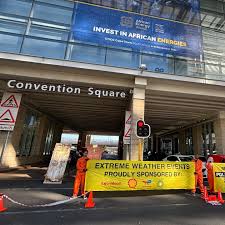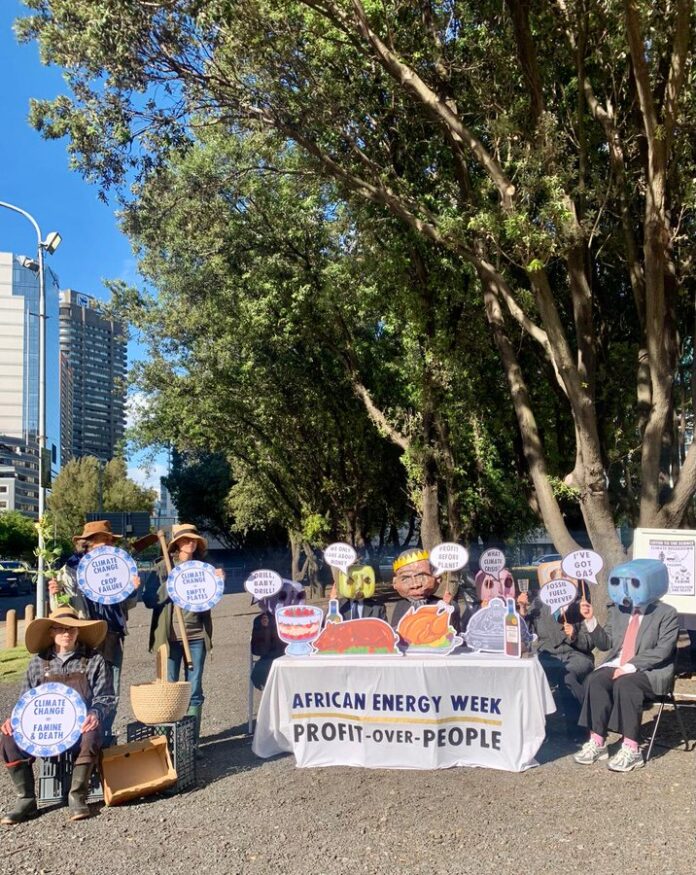By Gabs Mia
Cape Town, South Africa: At the Africa Energy Week (AEW) conference held in Cape Town, Greenpeace Africa activists staged a protest to oppose the expansion plans of polluting energy companies across the continent. They unfurled banners and disrupted speeches, drawing attention to the detrimental impact of these companies on the environment.
The twelve activists blocked the Cape Town International Convention Center (CTICC) entrance, where AEW is being held, until being evacuated by security. The blockage used banners and remains of tragic extreme weather events, fuelled by emissions of international oil and gas companies, such as the catastrophic tornado in Tongaat, Durban, to create a powerful visual representation of the destruction caused by Big Oil. This included twisted metal, shattered wood, and other remnants of climate-induced devastation, making it impossible for attendees to ignore the damages that climatologists attribute to emissions by the oil and gas industry.
At the Cape Town International Convention Center (CTICC), where the AEW was being held, twelve activists staged a demonstration by blocking the entrance. Their protest involved using banners and remnants of devastating extreme weather events caused by emissions from international oil and gas companies, such as the catastrophic tornado in Tongaat, Durban, to create a powerful visual representation of the destruction caused by Big Oil.
The activists employed twisted metal, shattered wood, and other remnants of climate-induced devastation to convey the damages that climatologists attribute to emissions by the oil and gas industry, making it impossible for attendees to ignore the destructive impact of these companies’ actions on the environment.
 They also interrupted the keynote speech by event organizer NJ Ayuk before being removed from the main hall.
They also interrupted the keynote speech by event organizer NJ Ayuk before being removed from the main hall.
“We are protesting against one of the most egregious gatherings of fossil fuel profiteers. The AEW brings together the biggest polluters, including TotalEnergies, BP, ExxonMobil, and others, who continue to push Africa further into the climate crisis while reaping billions in profits. This is a shameless platform for multinational oil corporations to strike deals that line their pockets at the expense of African communities” Sherelee Odayar, Greenpeace Africa’s Oil and Gas Campaigner, said.
At the conference center, prominent banners read “No New Oil and Gas in Africa,” “Extreme Weather Events, Proudly Sponsored by Fossil Fuel,” and “Make Polluters Pay,” as the activists chanted, “Climate Justice Now.”
“We are returning debris from extreme weather events, symbolic of the damage caused by Big Oil, to the very corporations responsible. Africa will not remain silent while oil giants profit from our suffering. We cannot allow Africa to be sacrificed on the altar of fossil fuel profits. The voices of our communities must be heard, and the corporations responsible for this crisis must be made to pay for the harm they have caused” Cynthia Moyo, Greenpeace Africa’s Climate and Energy Campaigner Noted.
“Together with communities on the frontlines of the climate crisis, we are protesting outside the sheltered offices of some of the world’s largest polluters. We reject Big Oil’s assault on people and democracy and demand governments finally redress this by forcing oil and gas companies to stop drilling and start paying for the damage they have done” said Abdoulaye Diallo, Co-Head of Greenpeace International’s Stop Drilling Start Paying campaign.
The Africa Energy Week, organized by the African Energy Chamber (AEC), is marketed as the solution to Africa’s energy poverty. Led by the lobbyist NJ Ayuk, a convicted fraudster who was removed from UN conferences, the AEC relentlessly pushes policies that prioritize fossil fuel exploitation over the needs of the African people.
Such policies have left more than 600 million Africans without access to electricity and nearly one billion without clean cooking solutions while destroying local ecosystems and increasing insecurity.
Greenpeace Africa demands a stop to the expansion of fossil fuels—no new oil, gas, or coal. Fossil fuel corporations must also pay for the destruction they have caused across Africa. We call for a just transition that redirects investment from fossil fuel energy projects to renewable energy solutions that uplift African communities, create green jobs, and protect our ecosystems.
We also demand that global financial institutions, including the IMF, World Bank, and private investors, immediately stop funding fossil fuel projects in Africa, which exacerbate the climate crisis. It is time to support a clean, green future for the continent.














